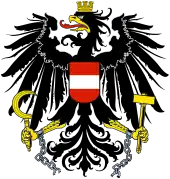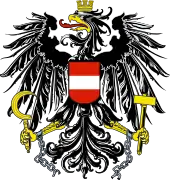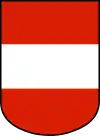Foreign relations of Austria
The 1955 Austrian State Treaty ended the four-power occupation and recognized Austria as an independent and sovereign state. In October 1955, the Federal Assembly passed a constitutional law in which "Austria declares of her own free will her perpetual neutrality." The second section of this law stated that "in all future times Austria will not join any military alliances and will not permit the establishment of any foreign military bases on her territory." Since then, Austria has shaped its foreign policy on the basis of neutrality.
| This article is part of a series on the |
| Politics of Austria |
|---|
 |
In recent years, however, Austria has begun to reassess its definition of neutrality, granting overflight rights for the UN-sanctioned action against Iraq in 1991, and, since 1995, contemplating participation in the EU's evolving security structure. Also in 1995, it joined the Partnership for Peace, and subsequently participated in peacekeeping missions in Bosnia. Discussion of possible Austrian NATO membership intensified during 1996. ÖVP and Team Stronach aim at moving closer to NATO or a European defense arrangement. SPÖ and FPÖ, in turn, believe continued neutrality is the cornerstone of Austria's foreign policy, and a majority of the population generally supports this stance.
In February 2000, Austria's foreign relations underwent controversy when the ÖVP formed a coalition with the FPÖ after the 1999 election. European governments imposed diplomatic sanctions, and the United States recalled its ambassador.[1] Sanctions were lifted in September 2000 after a three-member panel assessed human rights and political life in Austria.[2] In November 2000, the United States and Austria normalized their relations.[3]
Austrian leaders emphasize the unique role the country plays as an East-West hub and as a moderator between industrialized and developing countries. Austria is active in the United Nations and experienced in UN peacekeeping efforts. It attaches great importance to participation in the Organisation for Economic Co-operation and Development and other international economic organizations, and it has played an active role in the Organization for Security and Cooperation in Europe (OSCE).
Vienna hosts the Secretariat of the OSCE and the headquarters of the International Atomic Energy Agency, the United Nations Industrial Development Organization, and the United Nations Drug Control Programme. Other international organizations based in Vienna include the Organization of Petroleum Exporting Countries, the Organization for International Economic Relations (OiER) and the International Institute for Applied Systems Analysis. Recently, Vienna added the preparatory commission for the Comprehensive Test Ban Treaty Organization and the Wassenaar Arrangement (a technology-transfer control agency) to the list of international organizations it hosts. Furthermore, the Permanent Secretariat of an international territorial treaty for the sustainable development of the Alps called the Alpine Convention is located in Tyrol's capital Innsbruck.
Austria traditionally has been active in "bridge-building to the east," increasing contacts at all levels with Eastern Europe and the states of the former Soviet Union. Austrians maintain a constant exchange of business representatives, investment, trade, political leaders, students, cultural groups, and tourists with the countries of central and eastern Europe. In addition, the Austrian Government and various Austrian organizations provide assistance and training to support the changes underway in the region.
Bilateral relationships
Austria maintains significant bilateral relations with several countries.
Africa
| Country | Formal Relations Began | Notes |
|---|---|---|
| 1929 | See Austria–Egypt relations
| |
| 1908 | See Austria–Kenya relations
| |
| ||
| ||
| ||
| ||
| ||
| ||
|
Americas
| Country | Formal Relations Began | Notes |
|---|---|---|
| 1864 | See Argentina–Austria relations
| |
| 1989 |
| |
| ||
| See Austria–Brazil relations | ||
| 1929 | See Austria–Canada relations
| |
| 1846 | See Austria–Chile relations
| |
| 1920 | see Austria–Colombia relations
| |
| ||
| ||
| ||
| ||
| ||
| ||
| 1842 | See Austria–Mexico relations
During the French intervention in Mexico between 1864 and 1867, with French backing Maximilian I of Mexico, member of Austria's Imperial Habsburg-Lorraine family was proclaimed Emperor of Mexico.
| |
| ||
| ||
| 1921 | See Austria–United States relations
| |
See Austria–Uruguay relations
| ||
|
Asia
| Country | Formal Relations Began | Notes |
|---|---|---|
| 1992-01-24 | See Armenia–Austria relations
| |
See Austria–Azerbaijan relations
| ||
| 1971-05-28 | See Austria–China relations | |
| 1992 | See Austria–Georgia relations
Georgia opened its embassy in Vienna in 1996.[6]
| |
| 1949 | See Austria–India relations
| |
See Austria–Iran relations
| ||
| 1949 | See Austria–Israel relations
See also History of the Jews in Austria. | |
| 1869-10 | See Austria–Japan relations
| |
See Austria–Kazakhstan relations
| ||
| ||
| 1962-08-06 | See Austria–Malaysia relations
| |
| 1974[9] |
| |
| 1956 | See Austria–Pakistan relations
Relations between the two countries are generally friendly. The diplomatic ties between Pakistan and Austria were established in 1956 when Pakistan formally recognized Austria.
| |
| 1946-10-17 | See Austria–Philippines relations
| |
| 1957-09-10 | See Austria – Saudi Arabia relations
| |
| 1892 As Chosun Dynasty/1963-05-22[10] | See Austria–South Korea relations
The establishment of diplomatic relations between the Republic of Austria in German (Republik Österreich) and the Republic of Korea in Korean (대한민국) Started on 1892. In April 2007 the President of Austria Heinz Fischer paid a state visit to South Korea. It was the first ever state visit of an Austrian President to South Korea.[11]
| |
| See Austria–Turkey relations | ||
| ||
See Austria–Vietnam relations
| ||
| See Austria–Yemen relations |
Europe
| Country | Formal Relations Began | Notes |
|---|---|---|
| 1912 | See Albania–Austria relations
Austria-Hungary supported Albanian Declaration of Independence in 1912. | |
| 1992-02 |
| |
| 1833 |
| |
| ||
| 1878 | See Austria–Bulgaria relations
| |
| 1992-01-15 | See Austria–Croatia relations
| |
| 1960 | See Austria–Cyprus relations
| |
| 1920-01-20 | See Austria–Czech Republic relations
Both countries are full members of the European Union. They share 362 km of common border, which can be crossed anywhere without border control due to the Schengen Agreement. | |
| 1925-12-19 | See Austria–Denmark relations
| |
| 1921-06-26 |
| |
| 1918-07-19 | See Austria–Finland relations
| |
| 1535 | See Austria–France relations
| |
See Austria–Germany relations
| ||
See Austria–Greece relations
| ||
| ||
| 1921 | See Austria–Hungary relations
| |
| 1928 |
| |
| 1951 |
| |
See Austria–Italy relations
| ||
| 2008 | See Austria–Kosovo relations
| |
| 1921-02-17 |
| |
| ||
| 1991 |
| |
| 1792 |
| |
| ||
| 1992-03-25 | See Austria–Moldova relations
| |
| 2006-07-12 | See Austria–Montenegro relations
| |
| ||
See Austria–North Macedonia relations
| ||
| ||
| 1921 | See Austria–Poland relations
| |
| 1878-09-22 |
| |
| See Austria–Russia relations | ||
| 1874 | See Austria–Serbia relations
Both countries established diplomatic relations in 1874. | |
See Austria–Slovakia relations
| ||
See Austria–Slovenia relations
| ||
See Austria–Spain relations
| ||
See Austria–Sweden relations
| ||
See Austria–Switzerland relations
| ||
| See Turkey in Asia Above | ||
| 1992 | See Austria–Ukraine relations
| |
| 1799 | See Austria–United Kingdom relations
|
Oceania
| Country | Formal Relations Began | Notes |
|---|---|---|
| 1948 | See Australia–Austria relations
| |
See Austria–New Zealand relations
| ||
| October 2005 |
Both countries established diplomatic relations in October 2005.[15] |
See also
- List of diplomatic missions in Austria
- List of diplomatic missions of Austria
- Federal Ministry for European and International Affairs (Austria)
- Visa requirements for Austrian citizens
References
- Watson, Paul; Dahlburg, John-Thor (2000-02-05). "Austria's Far Right Is Sworn Into Office". Los Angeles Times. Retrieved 2008-11-24.
- Daley, Suzanne (2000-09-13). "Europe Lifts Sanctions on Austria, but Vows Vigilance". The New York Times. Retrieved 2017-02-17.
- "U.S., Austria Normalize Ties as Reaction to Rightists Eases". Los Angeles Times. 2000-11-09. Retrieved 2008-11-24.
- "Embassy of Georgia to Austria". Ministry of Foreign Affairs. Archived from the original on 2007-07-09. Retrieved 2009-06-11.
Diplomatic relations between Georgia and Republic of Austria were established in 1992. Georgia opened its Embassy in Vienna in 1996. The relations between the two countries are close and friendly. Georgia appreciates Support of Austrian Government in different fields of bilateral relations. In addition the commercial and cultural ties are also very important, but do not reflect its full potential and has a big prospective to develop.
- "Austria To Lift Iranian Diplomat's Immunity Over Alleged Bomb Plot". Radio Free Europe/Radio Liberty. July 3, 2018.
Austria is stripping the immunity of an Iranian diplomat suspected of involvement in an alleged plot to bomb a meeting of exiled Iranian opposition groups in France.
- Reinhart Zimmermann (2008). "Österreichs Wirtschaftsbeziehungen in Südostasien (Austrian Economic Relations to South-East Asia)" (PDF) (in German). Society for South-East Asian Studies. p. 80. Archived from the original (PDF) on 2014-05-24. Retrieved 24 May 2014.
- "북한 오스트리아 수교 : 네이버 통합검색". Search.naver.com. Retrieved 2016-10-22.
- "Ministry of Foreign Affairs, Republic of Korea-Europe". Mofa.go.kr (in Korean). Archived from the original on 2013-12-24. Retrieved 2016-10-22.
- "Bundespräsident Heinz Fischer zu Staatsbesuch in Südkorea eingetroffen" (in German). Federal President of the Republic of Austria. Archived from the original on 7 November 2007. Retrieved 18 November 2008.
- "Bulgariens Präsident von pünktlichem EU-Beitritt 2007 überzeugt" (in German). Federal President of the Republic of Austria. Archived from the original on 22 August 2007. Retrieved 19 November 2008.
- "Bilateral Relations between Austria and Australia". Austrian Embassy Canberra. Archived from the original on 12 August 2011. Retrieved 19 November 2008.
- "Austria-born" (PDF). Department of Immigration and Citizenship (Australia). Retrieved 19 November 2008.
- "SOLOMONS, AUSTRIA SIGN DIPLOMATIC TIES - Pacific Islands Report". Pireport.org. Retrieved 24 March 2019.
Further reading
- Horn, David Bayne. Great Britain and Europe in the eighteenth century (1967) covers 1603-1702; pp 111-43.
External links
- International − Austrian magazine on foreign policy
 This article incorporates public domain material from the CIA World Factbook website https://www.cia.gov/the-world-factbook/.
This article incorporates public domain material from the CIA World Factbook website https://www.cia.gov/the-world-factbook/. This article incorporates public domain material from the United States Department of State website https://www.state.gov/countries-areas/. (U.S. Bilateral Relations Fact Sheets)
This article incorporates public domain material from the United States Department of State website https://www.state.gov/countries-areas/. (U.S. Bilateral Relations Fact Sheets)



